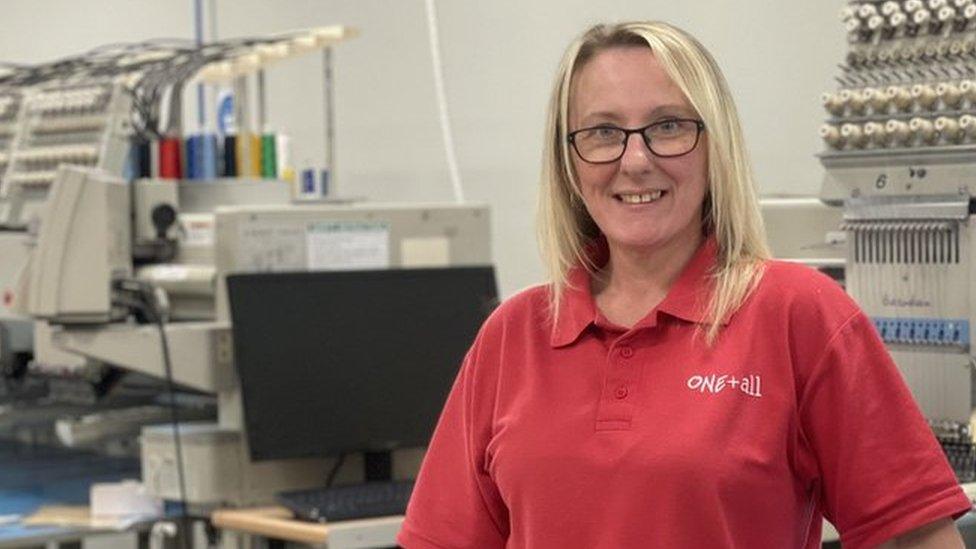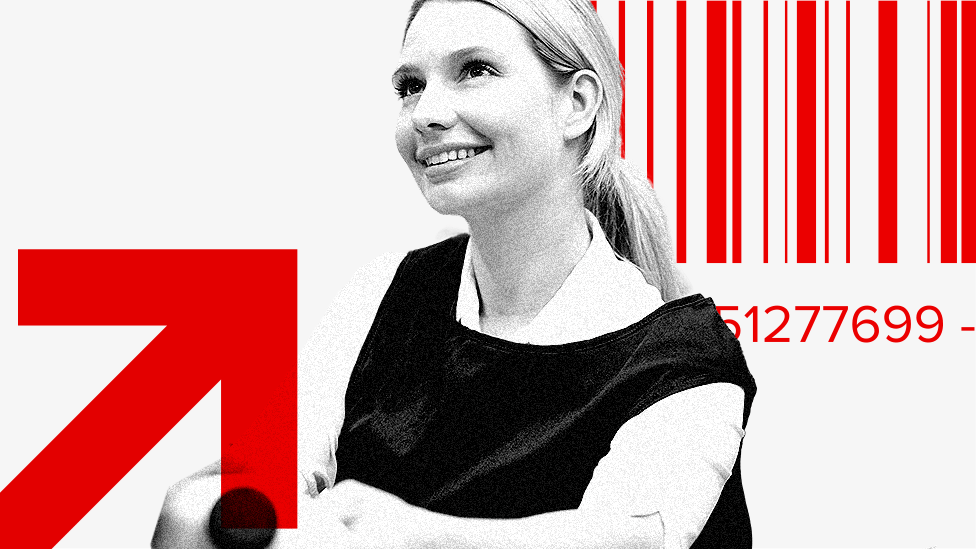Workers on voluntary Real Living Wage see 10% pay rise
- Published

Jo Mcmahon says being paid the real living wage means she can save for a rainy day
Hundreds of thousands of UK workers will see a 10% pay rise from Tuesday, because their employer is signed up to the voluntary Real Living Wage scheme.
The rise - from £10.90 to £12 an hour outside London - would be a "lifeline" for low-paid workers, the Living Wage Foundation said.
Employers can choose to pay the real living wage, a rate that is higher than the government-set minimum wage.
But a business group warned there was "a limit" to what firms could afford.
Among the workers set to benefit is Jo Mcmahon, a textile worker from Stockport. She works for school uniform manufacturer One & All, which pays its workers at the higher "Real Living Wage" rate.
"It means I've got money I can put away each month," she said. "It's just made such a difference."
"If the washing machine breaks, I've got the money for that. If we want a nice, big holiday, I can book it."
She notices the difference compared to her friends, who can't afford to go out as often as she does.
Employers who join the Real Living Wage scheme, set up by the Living Wage Foundation, external charity, make a commitment to pay their staff at a rate that reflects what the charity thinks people need to cover everyday costs.
After this rise it is £1.58 more than the government-set minimum wage, the National Living Wage, external of £10.42 an hour for those over the age of 23.
Workers in London will see their pay rise from £11.95 to £13.15 if their employer has joined the scheme.
A full-time worker earning the new Real Living Wage will earn £3,081 a year more than someone on the current government minimum, and an additional £5,323 in London, according to the foundation.
Around 14,000 employers have signed up, benefitting over 460,000 workers, the foundation said.
"Yes, it costs more money," said Brett Mendell, director of textiles manufacturer Thomas Kneale in Manchester. "But you get significant savings, greater productivity, greater loyalty and a fantastic feel from colleagues. The benefits really do stack up."
The firm has seen a 60% reduction in staff turnover and 75% reduction in absence since it signed up to the scheme, Mr Mendell said.

Brett Mendell says his firm has seen a big drop in days off and staff turnover since joining the scheme
Well-known firms such as Everton FC, Ikea and Lush are living wage employers. Half of the companies in the FTSE 100 share index are signatories.
More than 100 firms, including Aviva, abrdn and West Bromwich Building Society have also signed up to the foundation's Living Hours commitment. That means they provide workers with a guaranteed minimum of 16 hours work a week, a month's notice of shift patterns, and contracts that accurately reflect the hours they work.
However, some organisations were choosing not to sign up to the scheme in the face of a "cost-of-business" crisis, said Charles Cotton, from the CIPD, the professional body for HR and people development.
"While paying employees more can generate a return on investment, this return takes time," Mr Cotton said.
The alternative was to improve productivity by investing in technology, products, marketing, skills and management, and then use the profit generated to increase wages, he said.
Jane Gratton at the British Chambers of Commerce said the Real Living Wage would help with recruitment and retaining staff.
But with business conditions "among the hardest in generations" some firms were not in a position to make above-inflation pay increases, she said.
The Living Wage Foundation said record numbers of employers were joining the scheme, but there were still 3.5 million people "at the sharp end" of the cost-of-living crisis.
The rise in the real Living Wage rate reflected "persistently high costs", said the foundation's director Katherine Chapman, despite recent falls in the headline rate of inflation.
"Low-paid workers continue to struggle with stubbornly high prices because they spend a larger share of their budget on food and energy," she said.
The Foundation says its research shows half of the UK's low paid workers are worse off than they were a year ago, with many using foodbanks and falling behind on household bills.

What is the 'Real Living Wage'?
The voluntary "Real Living Wage" is set by the Living Wage Foundation, external charity. It is higher than the legal minimum wage, reflecting what the charity thinks people need to earn to cover everyday needs
It is currently £13.15 per hour in London, and £12 per hour elsewhere in the UK
More than 14,000 employers throughout the UK have signed up to the policy, covering more than 460,000 workers
The compulsory National Living Wage is £10.42 an hour for anyone over the age of 23


Will you see a 10% pay rise? What does this mean to you? You can get in touch by emailing haveyoursay@bbc.co.uk, external.
Please include a contact number if you are willing to speak to a BBC journalist. You can also get in touch in the following ways:
WhatsApp: +44 7756 165803
Tweet: @BBC_HaveYourSay, external
Please read our terms & conditions and privacy policy
If you are reading this page and can't see the form you will need to visit the mobile version of the BBC website to submit your question or comment or you can email us at HaveYourSay@bbc.co.uk, external. Please include your name, age and location with any submission.
- Published17 October 2023


